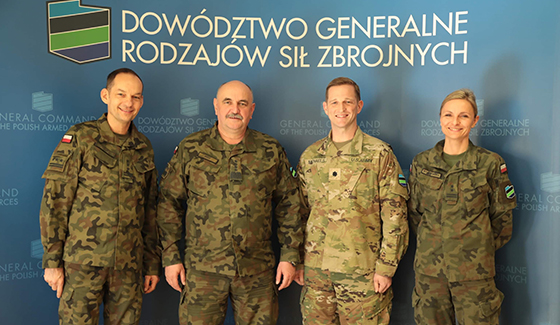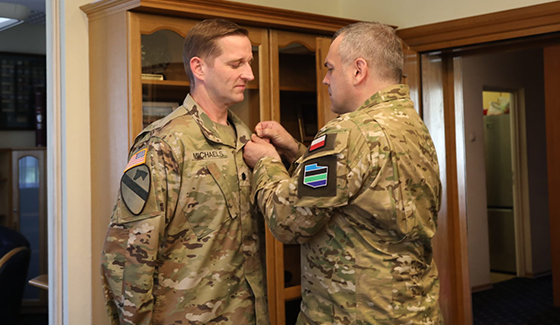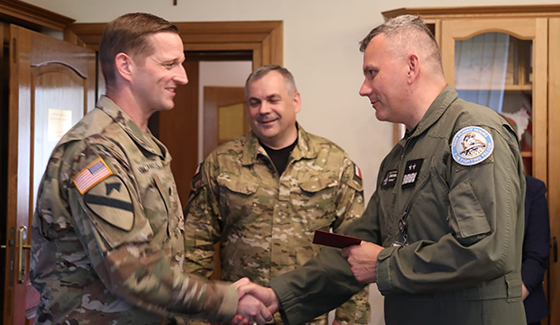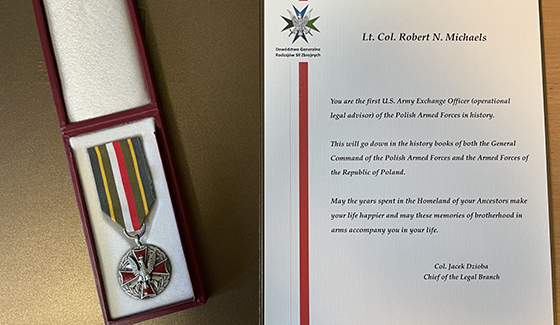THE ARMY LAWYER Q&A WITH LIEUTENANT COLONEL ROBERT N. MICHAELS '05
Lieutenant Colonel (LTC) Robert N. Michaels, class of 2005, was featured in the October issue of The Army Lawyer. With his permission, Penn State Dickinson Law is sharing that Q&A, which has been adapted to include his reflections on his time at Penn State Dickinson Law and the impact of the Law School on his career path.
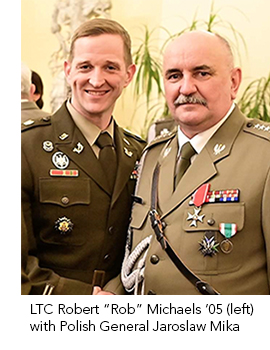 Lieutenant Colonel (LTC) Robert “Rob” Michaels ’05 recently returned to the United States after a two-year tour as the first-ever U.S. Army Exchange Officer to the Republic of Poland. During his two years in Warsaw, he served as an Operational Law Attorney to the General Commander of the Polish Armed Forces. Arriving in August 2021, LTC Michaels was tasked with integrating into the Polish Armed Forces and enhancing the legal interoperability between the U.S. and Polish militaries. When Russia invaded neighboring Ukraine in February 2022, LTC Michaels was uniquely positioned to observe the monumental efforts of the United States and Poland to provide military assistance to Ukraine and advise senior officials in the Polish military command structure on the international law implications of arming Ukraine.
Lieutenant Colonel (LTC) Robert “Rob” Michaels ’05 recently returned to the United States after a two-year tour as the first-ever U.S. Army Exchange Officer to the Republic of Poland. During his two years in Warsaw, he served as an Operational Law Attorney to the General Commander of the Polish Armed Forces. Arriving in August 2021, LTC Michaels was tasked with integrating into the Polish Armed Forces and enhancing the legal interoperability between the U.S. and Polish militaries. When Russia invaded neighboring Ukraine in February 2022, LTC Michaels was uniquely positioned to observe the monumental efforts of the United States and Poland to provide military assistance to Ukraine and advise senior officials in the Polish military command structure on the international law implications of arming Ukraine.
Q: Where were you when Russia invaded Ukraine?
On the night of the invasion, I was in the Headquarters of the General Command of the Polish Armed Forces in Warsaw. As the first U.S. Army Exchange Officer to Poland, I sat in the office of one of two Polish four-star generals, General Jaroslaw Mika, and briefed him on a draft emergency agreement between the United States and Poland to grant the U.S. military in Poland certain operational authorities on Polish territory. The stress and tension in those moments are hard to fully describe.
My Polish colleague, Lt.Col. Malgorzata Starzomska, and I jointly briefed the General in English and Polish on the applicable Polish, U.S., and international law. General Mika signed the document granting the U.S. the requested authorities, which we transmitted to Polish and U.S. military officials. Within an hour, the U.S. Army was operating on Polish soil. That was when my Polish colleagues and I realized the incredible wisdom and foresight of both our governments that led to pairing together a U.S. and Polish military legal advisor in that particular headquarters six months prior.
Q: What was your career path that led you to Warsaw advising Polish Officials in February 2022?
I received a B.A. in Political Science from Penn State and then graduated from Penn State Dickinson Law in 2005. I then entered active duty military service as a direct commissionee to the U.S. Army Judge Advocate in January 2006. I also have an L.L.M. from the Judge Advocate General’s Legal Center and School. My assignments, prior to Poland, were very typical of a JAG officer. I deployed to Iraq with the 1st Cavalry Division in 2006-07, followed by tours in Europe and Korea.
In the Fall of 2020, I served as the Deputy Chief of Operations in the Criminal Law Division, Office of the Judge Advocate General (OTJAG) at the Pentagon. In July of 2020, during the COVID-19 pandemic, I returned home from a fourteen-month assignment as the Brigade Judge Advocate for the 210 Field Artillery Brigade at Camp Casey, Korea. After serving three consecutive one-year assignments, I fully expected to serve two years in OTJAG. I was relieved because my family had previously moved from Pennsylvania to the Washington, D.C. area, so being stationed at the Pentagon was an opportunity to be close to family and friends.
During this time, one of The Judge Advocates General of the U.S. Army (TJAG), Lieutenant General (LTG) Charles Pede’s high-priority initiatives was to establish the U.S.-Polish Legal Exchange Program. LTG Pede recognized that the ever-increasing presence of U.S. troops in Poland would likely raise legal friction points and pursued the exchange initiative directly with the head of the Polish Ministry of Defense Legal Services. The position was unique in that it was not merely the first exchange of military legal advisors between the U.S. and Poland, it was to be the first exchange of a U.S. Army Officer to the Republic of Poland.
I was initially considered for the position because several of my former Army bosses knew of my Polish heritage and that I have strong cultural ties to the country. Most of my family emigrated to the United States in the early 1900s to escape the instability that resulted from the constant shifting of Polish borders due to the influence of powers like Russia and Germany. During my first tour in Europe, I was able to travel extensively around Poland and learn more about Polish culture, current events, and my own family heritage.
In November 2020, I started receiving calls from colleagues and mentors involved in creating the new position gauging my interest. My initial reaction, fresh off a one-year assignment in Korea, was to say, “no thank you.” After those early efforts to recruit me to the position failed, my former Staff Judge Advocate (SJA) from my first tour in Europe, Colonel (COL) Gail Curley, then-Chief of OTJAG National Security Law Division at the Pentagon, called me and asked if I was interested in this new position. COL Curley explained the importance of the position, why she wanted to nominate me, and what it would mean for my career. Being a new and untraditional JAG Corps job, it took a leap of faith.
I took the time to speak with family, friends, and mentors and quickly concluded that this was an opportunity that I could not pass up. By early the following week, LTG Pede approved my nomination. In February 2021, I was promoted to Lieutenant Colonel and was enrolled full-time in a six-month intensive Polish language class through the Defense Language Institute Foreign Language Center – Washington. I arrived in Warsaw in late August 2021.
Q: How did you integrate into the Polish Armed Forces?
During my first week at General Command, General Jaroslaw Mika, General Commander of the Polish Armed Forces, introduced me to a room full of Polish Generals and Admirals and noted that I was an exchange officer, not a liaison (as were the handful of other Americans in the Headquarters). He specifically stated “LTC Michaels is one of us and you will treat him as such.” One of the Staff Officers gave me a Polish flag patch for my uniform, which I wore on the sleeve opposite my U.S. flag as a symbol that I was serving in the Polish Army.
It took a lot of patience from both myself and my Polish colleagues to determine my daily functions. The position was created so quickly that none of us knew what the duties of the exchange Operational Law Attorney would be. In accordance with the guidance of LTG Pede, I focused my efforts less on the formal duty description I was given and more on building relationships with Polish officials and legal professionals. I traveled around Warsaw and other cities in Poland meeting with military legal officers, military judges, prosecutors, general officers, civilian legal officials, and anyone else who was willing to let me into their office.
I spent the first few months introducing myself, but more importantly, listening and asking questions. My goal was to understand not only what Polish law said but why it was structured in particular ways. I quickly learned that you cannot understand Poland if you do not understand Polish history.
During World War II, Poland lost twenty percent of its population. When Poland was invaded by Germany on September 1, 1939, their allies with whom they had defense treaties failed to come to their assistance. After brutal and valiant fighting by the Polish military, they eventually capitulated when the Soviets joined the Nazis and invaded from the East. Over 10,000 Polish officers were murdered by the Soviets during the Katyn massacre in 1940. Furthermore, at the beginning of the war, Poland had 3.3 million Jewish citizens, but by the end, there were less than 300,000. Most Poles view the 50 years after World War II under Soviet control as a product of betrayal by their Allies who ceded Poland, without authority, to the Soviet Union at the Yalta Conference.
Given the magnitude of the impact of this period on Poland, it is very rare to encounter a Pole who does not have a personal connection to a tragedy of those times. It also greatly influences how they have structured their legal system. For example, a commonly occurring friction point between the U.S. and Polish militaries is that no foreign military personnel are permitted to enter Polish territory without the authorization of the President of Poland. This is clearly in response to the numerous invasions of Polish territory by foreign powers. Polish law is very restrictive as to what force the military is allowed to use on Polish territory because of the Martial Law period of the 1980s. Poland’s publicly stated national defense policy provides that Poland will defend every inch of Polish territory against foreign aggression as Polish territory is “sacred and red with the blood of Polish heroes.” Poland also negotiated regional alliances with neighbors outside of the NATO Treaty as “the collective defense agreement of the NATO Charter does not offer an instantaneous defense to Poland and we must be prepared to defend ourselves in the short term.” Each of these would become relevant to legal challenges I would face and advise both Polish and U.S. leaders on during my time in Poland.
Q: What did you experience in the lead up and immediate aftermath of the Russian Invasion of Ukraine?
Obviously, nobody predicted a large-scale ground war in neighboring Ukraine to break out when I was assigned to this newly created position. But it greatly changed my daily duties while simultaneously emphasizing how important and valuable this exchange was for both the United States and Poland. As Russian forces massed on the Ukrainian border, the legal issues we faced evolved into more complex and urgent.
A week before the Russian invasion, my Polish colleagues and I were tasked with researching the legal framework for lending military equipment to the Ukrainian armed forces. I did some research on the Lend Lease Act of 1941 and briefed my Polish colleagues on the general principles. One day later, we had a draft of the international agreement for review and the President of Poland signed it shortly thereafter.
From an observational perspective, the outpouring of support for Ukraine from the Polish people was extraordinary and humbling. Millions of Ukrainians fled across the Polish border and were given haven. At first, the assistance mission to the Ukrainian refugees was entirely organized and executed by the Polish people. After several weeks, the Polish Government stepped in to organize an overwhelming effort to provide these victims of aggression with food, shelter, employment, and protection.
As the war progressed, the legal questions focused on two main areas: (1) What authorities did U.S. military personnel have in Poland? and (2) Did international law allow Poland and the U.S. to arm and train the Ukrainian military? Poland was then and remains in a legal state of peace and neutrality.
International law recognizes the ability of a neutral country to provide military equipment to the victim of a belligerency without becoming a party to the armed conflict. This is not, however, the agreed upon view of some scholars and nations. Lt.Col. Starzomska and I were directed by General Mika to travel to Florence, Italy, and attend an international law conference to solicit the views of other legal scholars and officials from other nations, while also vocalizing Poland’s views on certain legal questions. Officials from the United States, United Kingdom, Canada, Italy, Germany, Norway, Netherlands, France, and a host of other nations attended. We also engaged in discussions with representatives of NATO and the International Committee of the Red Cross.
Q: What friction points existed between the U.S. and Polish militaries and how did you address them?
The United States and Poland have a long-standing military relationship. Since the Revolutionary War, Poles have fought alongside the U.S. military. Polish forces were extremely active in both Iraq and Afghanistan. However, the War in Ukraine and the U.S. mission in Poland presented an entirely different problem set.
From the beginning, it was apparent that Poland and the United States viewed the international legal landscape in a very similar way. The friction points between the United States and Poland in the build up to, and immediate aftermath of, the Russian Invasion were relatively minor given the agreements that existed between the two countries. In August of 2020, the United States and Poland signed the Enhanced Defense Cooperation Agreement (EDCA) which contemplated a growing U.S. military presence in Poland. This agreement became the legal and logistical framework for the rapid surge of U.S. forces into Poland.
Because Poland was legally neutral and legally in a state of peace, the U.S. forces who entered Poland were not engaged in a kinetic armed conflict or a contingency operation. Rather, it was and remains a presence and deterrence mission. The view of the Polish Government is that the Rules of Engagement that apply in armed conflict do not apply on Polish territory during times of peace and neutrality. As such, Poland’s view is, absent a conflict with a treaty or agreement between the United States and Poland, U.S. forces are subject to Polish law regarding the permissible use of force on Polish territory. In that regard, the Polish Presidential Order, which authorized U.S. troops to enter Poland, explicitly granted to U.S. forces all the authority to use force on Polish territory that Polish forces were granted. This included the Polish legal definition of self-defense.
It is standard teaching to U.S. military leaders that the U.S. will always apply its own definition of self-defense to its forces. I was tasked with facilitating discussions between U.S. and Polish military legal officials on this issue. While this issue has not necessarily been resolved, there is now a better understanding between our countries on the matter and practical guidance has been developed.
I am extremely proud that the United States military was the first to respond and surged thousands of troops into Poland in a very short period. The reaction of the Polish population to seeing large formations of U.S. troops was emotional and overwhelming. The U.S. presence in Poland was then, and remains, a poignant statement regarding the U.S. commitment to the security of one of our closest allies in Europe. On numerous occasions, Polish citizens approached me in public and asked for photographs with me in uniform. I kept a collection of U.S. flag patches in my pocket and handed them out when people thanked me or asked for pictures.
Q: Are there any moments of your time in Poland that stand out to you?
There are two moments that are especially meaningful to me. The first occurred on the anniversary of the Warsaw Uprising. The Warsaw Uprising occurred at 5pm on August 1, 1944, when the underground Polish Home Army, composed of civilians, women, and children, rose to fight the Nazi occupiers as the Soviet Army advanced on Warsaw from the East. The Home Army expected to be aided by the Soviet forces and resupplied by U.S. and British forces. Instead, the Soviet Army halted its advance while an insurgent underground Army of Polish citizens rose up to expel the Nazis from Warsaw. The Soviet Army deliberately waited for the Home Army and Nazis to fight it out in the city with the intent of finishing off whoever was left standing at the end of the battle. The Soviets also deliberately blocked the United States and United Kingdom from providing supplies. By the end of the 63-day uprising, 200,000 Polish citizens were killed, and Warsaw was destroyed.
Every year on August 1 at 5pm, the city of Warsaw stops for one minute and the World War II era air raid sirens are played across the city. On August 1, 2022, my colleagues encouraged me to go out into the city and experience the incredibly poignant remembrance events. At the Warsaw Uprising Cemetery, I encountered an elderly woman wearing the arm band insignia of the Polish Home Army, who fought the Nazis in the Summer and Fall of 1944. She was giving a TV interview and was clearly a veteran of the conflict. When the interview was over, I approached her and introduced myself in Polish, stating that I was a U.S. Army Officer serving in Poland and that I was honored to meet her.
I expected her to thank me for my service and commitment to US-Polish relations, as Poles had done so many times over the last several months. However, she quickly grabbed my arm and thrust a pointed finger at me and said sternly, “Do not abandon Ukraine like you abandoned us in 1944.” That was her world view through the eyes of her trauma. To her, the U.S. Army liberated Western Europe and left them behind the Iron Curtain where they remained for 50 years.
Her warning left me emotional and speechless. This woman fought as a sniper during the uprising, was wounded, and captured by German forces. She spent the remainder of the war in a German prison camp. All of this occurred after Poland’s Allies, to include the U.S., stood by and allowed them to suffer. Whenever I spoke with U.S. officials from that point forward, I told them that story as an example of how Poland views the current conflict. It also provided the context as to why the U.S. military presence now is so important and helped us message our unwavering commitment to Polish officials.
The second moment that stands out to me was on my last day in Poland before I returned home in June of 2023. I was summoned to the General Commander’s Office and Lt.Gen. Wieslaw Kukula (who became the General Commander upon General Mika’s retirement in February 2023, and is currently the Chief of the Polish Armed Forces) and Maj.Gen Cesary Wiesniewski, two extraordinary officers with whom I had the honor to serve, awarded me the Silver Polish Army Medal while my legal department colleagues looked on. Both Generals spoke of the importance of what my Polish colleagues and I achieved during our time together and their words were truly humbling.
Q: How did your time at Penn State Dickinson influence your career path?
Had it not been for the opportunities and experiences at Penn State Dickinson Law, it is very fair to say I would not be in the Army JAG Corps. Penn State Dickinson Law has a long and rich connection to the Army JAG Corps. My older sister, Rebecca (Michaels) Klein ’00 joined the Army JAG Corps and served for three years after graduation. My career path was greatly influenced by her experiences.
I was also fortunate to benefit from the Field Placement Clinic and JAG Corps Summer Hire Programs that placed me in the Carlisle Barracks JAG Office for over a year during my time at Penn State Dickinson Law. The connection between the Law School and the Carlisle Barracks JAG Office has existed for over two decades thanks to the work of individuals like Mr. Tom Kane and former Penn State Dickinson Law professor (and retired legendary Judge Advocate) the late Ed Haughney. My offer of a military commission in the JAG Corps was the direct result of the Penn State Dickinson Law Career Services Office finding a way to get me into the Carlisle Barracks JAG Office.
The commitment that Penn State Dickinson Law has to community service provides a natural path to the JAG Corps for those interested in the military. That is certainly not something that exists at every law school. Over the 18 years I have served in the Army JAG Corps, I have regularly encountered Penn State Dickinson Law alums in uniform. Service to the community and our nation is a proud part of the tradition of Penn State Dickinson Law and our alumni carry that tradition forward in many ways.
Q: Looking back, what did you learn from this experience?
Most notably, I learned the power of empathy. The law is at its core a human endeavor. It is a product of the experiences, triumphs, tragedies, and biases of the individuals who create and write the law. All of those human experiences are reflected in the law. To fully understand it, you must understand the experiences of those who shaped the law. I also learned the importance of viewing a common problem through someone else’s perspective, and to help my fellow countrymen understand and appreciate that perspective.
My time serving in Poland also allowed me to learn even more about own background. I am an extremely proud American. But growing up, I resented the idea that I could also be Polish, which was, at times, a significant source of friction within my family. But now, I understand the views of my Polish family more than I did before, and while I am and always will be first and foremost American, I find myself very proud to be of Polish heritage. Looking back, I would have given anything to have my grandfather and great-grandfather there while I was stood before Lt.Gen. Kukula and received a Polish military decoration. All the disagreements and arguments of the past were irrelevant, as I understood in that moment what they tried to teach me about my heritage and why I should be proud of it. When General Mika retired in February 2023, I wrote him a note thanking him for his support. In that note I said, “I always knew I was Polish, but now I understand what it means to be Polish.”
